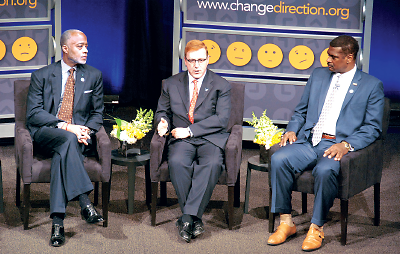“It is time to tell everyone who is dealing with a mental health issue in this country that they are not alone and that getting support and treatment isn’t a sign of weakness—it’s a sign of strength,” First Lady Michelle Obama told 500 mental health leaders and advocates at the launch in Washington, D.C., of the Change Direction campaign last month.
Change Direction will unite an array of corporations, government entities, and organizations to educate at least 30 million Americans about mental illness over the next five years. APA, the American Psychiatric Foundation, and American Psychiatric Publishing are founding members of the campaign.
The campaign builds on the work of Give an Hour, a nonprofit organization founded in 2005 by psychologist Barbara Van Dahlen, Ph.D., which arranges for mental health clinicians to provide pro bono services for veterans, military service members, and their families.
Speakers at the inaugural event emphasized the necessity of destigmatizing mental illness. People rarely fail to seek treatment for cancer, heart disease, or injuries but routinely do so in the case of mental illness, they noted. Too often they are deterred by feelings of shame, embarrassment, or lack of knowledge about mental illness and its treatments.
“We need to change the conversation about mental illness and recognize that it is no different from any other illness,” said APA CEO and Medical Director Saul Levin, M.D., M.P.A., who also spoke at the event.
To overcome the public’s perception of that difference, the campaign seeks to raise awareness and train people to recognize signs of emotional suffering in themselves and the people around them, said Van Dahlen. The five warning signs at the core of the campaign are withdrawal, agitation, hopelessness, decline in personal care, and change in personality. They serve, in a sense, as a simple, layperson’s screening tool.
Participating groups pledged to address several primary target audiences: military personnel, veterans, and their family members; corporate and government employees; first responders; students, teachers, school officials, and coaches; religious organizations; and health care professionals.
“There is a lot that ordinary people, those not trained as mental health professionals, can do,” said Arthur Evans Jr., Ph.D., director of the Philadelphia Department of Behavioral Health and Intellectual Disability Services. If so, it suggests that the nation could shift its thinking on the subject.
“The next breakthrough in our field will come not in medications or psychotherapy but in how can we change the public’s perception of mental health issues,” he said. “Learning the five signs demystifies mental health issues and gives people concrete steps they can take to help someone.”
Collaboration was a key to bringing the campaign together, said Levin, who appeared on a panel with Norman Anderson, Ph.D., CEO and executive vice president of the American Psychological Association, and Angelo McLain, Ph.D., CEO of the National Association of Social Workers.
“We need to work together to get the word out,” he added. “If we don’t speak up ourselves, no one else will.”
Ultimately, the larger conversation about mental illness and mental health is more than a matter of budgeting and policy, Obama emphasized.
“Our mental health is just as vital as our physical health, and treating it that way will take courage from everybody,” she concluded. “If we can summon that strength, then I guarantee that we will save lives, and soon enough, caring for our mental health won’t be considered such a courageous act. It will be just another part of our lives.” ■
Information about Change Direction can be accessed
here. Information in
Psychiatric News about Give an Hour is available
here.


